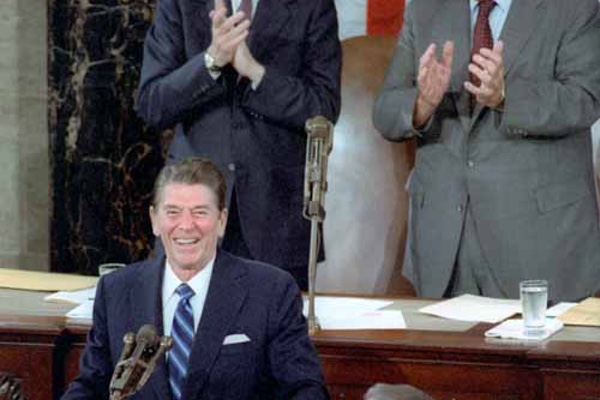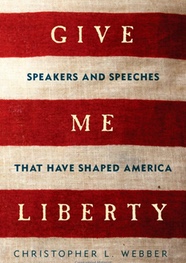Does Reagan Rank with Webster, Lincoln and Bryan as a Great Orator?

Democrats have many heroes, Republicans but one. Democrats proudly recall Jefferson, Jackson, Wilson, Roosevelt, Truman, and Clinton among others. Republicans might proudly claim Lincoln, perhaps the greatest of all, but that would win no votes in their southern base. They might claim Teddy Roosevelt whose features are carved into the Black Hills but TR, the “trust-buster”, was no friend of big business so he, too, may be mentioned only in whispers. What about Eisenhower? Didn’t everyone “like Ike”? Not when his principal monument is one of the biggest federal spending programs ever: the National Highway System.
 Still standing, though with increasing questions, is Ronald Reagan whose friends are well along in a campaign to name 3000 buildings and roads and airports and mountains after their hero. Some want him added to the quartet of presidents on Mount Rushmore while others want him carved into a mountain all his own.
Still standing, though with increasing questions, is Ronald Reagan whose friends are well along in a campaign to name 3000 buildings and roads and airports and mountains after their hero. Some want him added to the quartet of presidents on Mount Rushmore while others want him carved into a mountain all his own.
Yet when I published a book about the speakers who changed American history and included Ronald Reagan, I was asked , “Why Reagan?” Did he belong with such giants as Patrick Henry, Daniel Webster, Abraham Lincoln, Franklin Roosevelt, and Martin Luther King, Jr.? Does “Mr. Gorbachev, tear down this wall?” belong with “Give me liberty or give me death” and “I have a dream”? I am not a member of the RR Fan Club. I could have voted for him twice but it never occurred to me to do so. Yet I saw no way to exclude him from the short list of those whose oratory “shaped America.”
Let us recognize from the outset that political oratory is not measured on some objective scale, not even by political success. William Jennings Bryan and Adlai Stevenson lost five elections between them yet no one has questioned including them on the short list of great orators.
Nor is vocal quality or forensic ability an adequate standard. Huey Long and George Wallace were mesmerizing speakers but made no lasting impact. They were perhaps part of what Lincoln characterized as the “spread-eagle style: He mounted the rostrum, threw back his head, shined his eyes, opened his mouth, and left the consequences to God.” Stephen Vincent Benet wrote of Webster that “when he stood up to speak, stars and stripes came right out in the sky . . . . and, when he argued a case, he could turn on the harps of the blessed.”
Ronald Reagan was not like that, not an orator in the great tradition, nor was his voice to be compared with those of Patrick Henry or Daniel Webster. Columnist Richard Reeves spoke of the Reagan voice as “husky and honeyed” and speechwriter Ken Kachigian described it as “a fine Merlot being poured gently into a crystal goblet.” Reagan’s voice, intimate and personal, made him, supremely, an orator for the age of television, unmatched still in his ability to sound intimate and personal. For that reason alone he could not easily be omitted from a book about “speakers and speeches that shaped America.”
But isn’t it important, even for those who disagreed with him most strongly, to recognize that Reagan also made a difference? Like it or not, American politics has been changed by Reagan. Yes, he made up some of his “facts” and his stories. Yes, he misrepresented causes that he advocated and connived to find funding for wars that were none of our business as in Guatemala. Yes, he overdramatized the threat of communism and appealed to some of the worst instincts in the American body politic. But he made a lasting difference and that is why I gave him a place in my book.
Even at the surface level, the State of the Union address has been, apparently, forever changed. Reagan used that speech to introduce people in the gallery who exemplified some of the issues or virtues he was discussing. Every president since has followed suit and stocked the gallery with his own heroes. It wouldn’t, of course, have been effective before television but Reagan was an orator for the age of television.
Reagan changed not only the presentation of the issues but the issues themselves. Consider, for example, the fact that no one feels free any more to advocate raising taxes or expanding government services. Even in the “Great Recession,” when most economists agreed that government spending was the obvious remedy, few dared make such a suggestion and the recession lingered on far longer than necessary. As for the bogey of “big government,” Bill Clinton, the next Democrat to be elected president, seemed to be channeling Reagan in his 1996 State of the Union Address when he said,
We know big government does not have all the answers. We know there’s not a program for every problem. We know, and we have worked to give the American people a smaller, less bureaucratic government n Washington . . . The era of big government is over.
Thirty years after Reagan, Barack Obama still felt a need to assure the country that “our government is leaner, quicker, and more responsive.”
The essential issue for Ronald Reagan was human freedom. “Man is not free,” he said, “unless government is limited.” There, of course, is the central issue of American society. For the first “four score and seven” years of American democracy the issue was whether we would have a government strong enough to free the slaves. After that it was whether the federal government would be strong enough to guarantee civil rights to its citizens regardless of color. Increasingly, from the time of William Jennings Bryan and Theodore Roosevelt, the issue has been whether the federal government can and should free its citizens from the various constraints that limit their opportunities for better jobs, better education, better health care. That kind of freedom remained outside Reagan’s field of vision.
Americans have always had a love/hate relationship with government control. The same citizens who decry government involvement in health care have no trouble passing laws to control access to abortion clinics. Citizens who would be outraged at a government that told them what to read pass laws decreeing what history books to provide for their children.
Reagan was right: “Man is not free unless government is limited.” But neither are people free unless economic restraints on opportunity are limited and only government can impose such limits. The question is what limits are appropriate and necessary. Ronald Reagan brought that debate center stage where it belongs but shifted the whole stage to the right. Like him or loathe him, the debate must go on.
